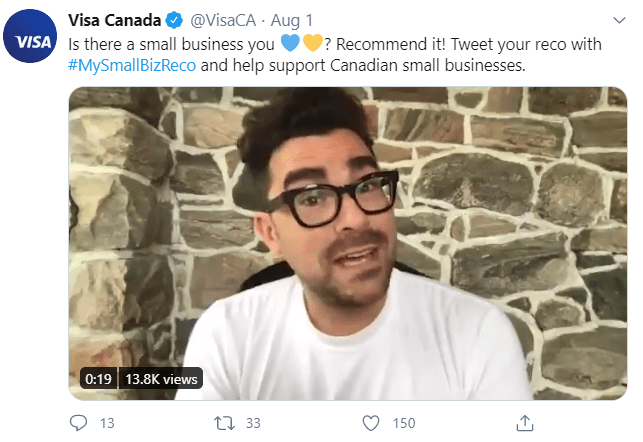How Visa Canada is helping its community during COVID-19
The company looked at how small business owners were hurting during the pandemic and came up with a campaign to try and help them find new customers.

The media landscape is still dominated by COVID-19—and the narrative is unlikely to change as the U.S. heads into the last months of the presidential election.
However, organizations can still drive the conversation with efforts to help their community.
For Visa Canada, that meant figuring out how to support the small businesses that make up 98% of all businesses in Canada, and 70% of employers. It knew that these organizations were hurting from research it did for its Visa Back to Business study: One-third (33%) of Canadian small businesses don’t consider their local community supportive of their business during COVID-19.
It decided to take action with the #MySmallBizReco campaign, connecting high-profile influencers with small businesses to generate buzz about vendors trying to keep their doors open. Once the recommendations start flooding in, Visa hopes to help highlight these businesses.
Visa Canada is also creating a website where it will list organizations that are open for business called Visa Back-to-Business Locator. The site will hopefully drive new customers to find vendors as they try to find new customers online.
Visa Canada is also partnering with Google Partner Kliken to offer $150 in Google Adwords credit to help small businesses attract crucial online web traffic.
Finding celebrity partners
For the social media component, it was important to find the right voices to amplify the message
Heather Nobes, Visa Canada’s senior director marketing and sponsorships, says that the brief for finding influencers to partner with came down to finding a “well-known and well-loved Canadian who is genuinely passionate about supporting Canadian small businesses.”
It went with actor Dan Levy, star of “Schitt’s Creek” and an active social media user, as well as other influencers who could help amplify the message.
Is there a small business you 💙💛? Recommend it! Tweet your reco with #MySmallBizReco and help support Canadian small businesses. pic.twitter.com/zN3phN6RVn
— Visa Canada (@VisaCA) August 1, 2020
To get partners on board, Visa made the pitch about “the importance of supporting small businesses through these challenging times” and a “desire to find a collaborative partner who would bring further authenticity to our message,” as well as help represent diverse, Canadian voices.
Getting the word out
To spread the message, Visa Canada left no stone unturned.
It ran paid media on social media platforms like Facebook, Instagram and Twitter, in addition to media on YouTube and other Google platforms. It also turned to “more than 20 ethnically, regionally and gender diverse influencers” to help explain the need to recommend small business online and offer their own recommendations online.
It’s also supporting the effort with earned media, turning to its handy Back to Business Study to pitch outlets with data insights to help bring awareness to their effort.
Need an end-of-summer page turner? We've heard great things about @owlsnestbooks in Calgary! #MySmallBizReco https://t.co/zWUG3CGQoG
— Visa Canada (@VisaCA) August 14, 2020
A local business that supports local artists? Now that's a win-win! #MySmallBizReco https://t.co/nZzZwPFxsT
— Visa Canada (@VisaCA) August 14, 2020
Looking to up your daily coffee and tea game? Check out @cozyelephant_ and their cozy tea and coffee blends! #MySmallBizReco https://t.co/5hVq8ecrR8
— Visa Canada (@VisaCA) August 14, 2020
Lessons learned
Nobes offers a few key takeaways from her work on the campaign:
1. “Production in a COVID-19 world is tough.” Nobes says this is especially true for trying to create video content when things have been locked down. “Shooting and directing content capture via Zoom is a challenge and you need to be more flexible and open to new ways of working,” she says.
2. Influencer marketing—done right—takes a lot of work. “Influencer marketing is a powerful tool,” Noebs says, “But you have to work hard to get the right influencers in place who get the brief and feel motivated by the mission to support small businesses.
3. A purpose can change everything. Having a common goal is incredibly motivating for everyone working on the project. “Having a shared goal to support small businesses (70% of Canadians) is really motivating for the Visa and agency teams,” Nobes says.
4. Social listening is paramount. “During this emotionally charged time, it is more important than ever for communicators to carefully assess the social media landscape,” Nobes says. This means having extensive monitoring programs and making sure that your content is sensitive to the current mood, particularly on issues like ethnic representation.
“For Visa, this meant ensuring cultural diversity both with our influencer program as well as the SMBs being featured as part of the program,” Nobes says.
5. It’s a digital world, no matter what you sell. The campaign has also highlighted just how important your digital presence is during the COVID-19 pandemic—and will be long after this crisis is over.
“It’s important for SMBs to look for ways to increase their digital footprint,” Nobes says, “And social media is a great tool to help them achieve this. Whether it be through a robust content strategy or influencers, social media provides a great and economical way to meaningfully engage with existing and prospective customers.”







